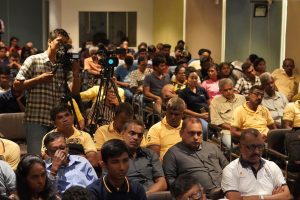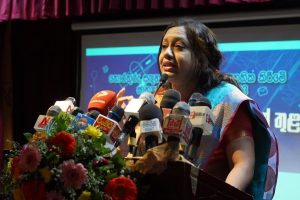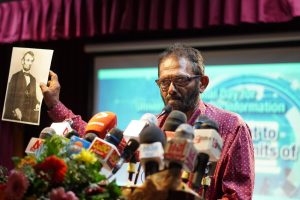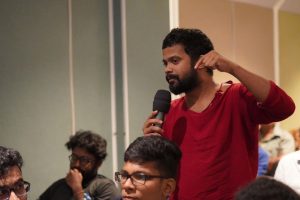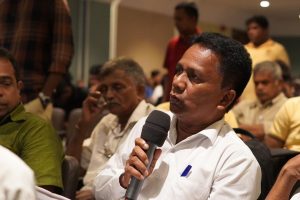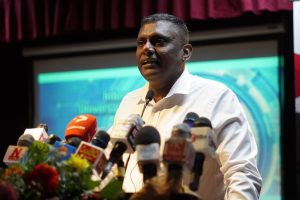
- A seminar by Journalists for Rights to commemorate the International Day for the Universal Access to Information
Journalists for Rights organization held a seminar in Colombo National Library on 26 September 2024 to commemorate the International Day for the Universal Access to Information which falls on 28 September every year.
The theme of the seminar was the Future of Right to Information in the Limits of Cyberspace and it was held by the time the government of Sri Lanka had published a draft bill on online safety on gazette. Delivering one of the keynote addresses of the seminar Viranjana Herath, Attorney-at-Law of the Media Law Forum said that this bill if passed as an Act would severely affect the freedom of expression in Sri Lanka. He expressed the following views as well in his presentation.
“Right to Access to Internet is a primary requirement in the present-day human life. Therefore, unrestricted access to internet has been guaranteed as a basic right in many countries in the world. In Sri Lanka, Sri Lankans experienced enormous difficulties when social media was blocked temporarily for a couple of days by state by the time of violence in Digana in 2017 to prevent the use of social media to mobilize violence. Other than information, people engage in many other important activities like business using internet. Therefore, the unrestricted internet is essential today.
“The proposed Online Safety Act aims to appoint a Commission which has powers to ban communication of certain statements the Commission decides false within Sri Lanka. If the publisher does not comply with the orders of the Commission, that person can be punished by the Commission, and a case can be filed against that person before a Magistrate Court. The Commission has powers to ban online accounts, identify IP addresses that are used for illegal acts, ban fake accounts etc.
“As a lawyer I do not see this Act a good move. However, some unethical acts, fake news, hate speech, disinformation etc. can be banned and the perpetrators can be punished. The system used for this is problematic.
“The five-member Commission is appointed by the President. He can appoint as well remove them. Any member who is appointed to this committee has to act according to the requirements of the President and therefore, this cannot be considered an independent commission.
“One can argue that this Act provides for the protection for the individuals affected by information disorder. It addresses issues such as contempt of court, religious extremism, promotion of war and rebellion, fake news, disinformation, revealing private information and defamation etc. However, there are laws such as Computer Crimes Act, ICCPR Act and even PTA that can be used for that purpose. This Act will affect the freedom of expression.
“I observe that the powers under the criminal defamation law which was abolished in 2002 is being reintroduced this Act.
“Big tech companies that provide social media platforms are taken under state control to a certain extent by this proposed law. But will the big tech companies follow these rules? In Pakistan, Meta did not agree to it. Tech companies that do not comply can be fined for not abiding with the orders of the Commission. Will they comply or withdraw? What will happen to us in such instances?
“Social media expended the freedom of expression through freeing information from the gatekeepers like editorials and media owners. The implementation of laws like ICCPR Act against hate speech only occurred against persons like comedians and not the real culprits of hate speech.
“We cannot shut down or restrict internet and get the opportunities for the country. I believe this Act should be defeated and the available laws must be used against unethical and illegal acts. This Act will promote censorship and self-censorship, if it is implemented.”
Executive Director of Transparency International, Nadeeshani Perera, Attorney-at-Law said that declaration of information depicts accountability. “Only the corrupt elements want to hide and distort information. We have noticed information requests at the village level which were highly productive for their purposes. Pro-active exposure of information is among the responsibilities of public authorities under RTI Act. However, a recent survey conducted by Verite Research regarding 29 major public authorities revealed that only one institute was at a good standard on declaration of information. The Act clearly provides for proactive declaration of information but the implementation is very unsatisfactory,” she said.
Addressing the seminar, Treasurer of Journalists for Rights Rohana Siriwardena shared experiences of the organization and the journalists on the use of Right to Information. “When we visited 30 offices to file Right to Information applications to obtain crucial information, in some offices, we found that no officer in the institute knew who the information officer. In 2022, I requested some information from Bribery or Corruption Commission but the information was released to me after a full year. Obtaining information from even the Information Commission is extremely difficult. As an organization, we request the government and especially the Information Commission to act to implement the 2026 No. 22 Right to Information Act properly and to enhance the right to information of the people.”
Secretary of the Journalists for Rights, Dulan Dasanayake, Attorney-at-Law, emphasized the need for citizens’ engagement in strengthening the Right to Information. “A country which has guaranteed the Right to Information went bankrupt not only because of the fault of the politicians but also because of the lack of active citizenship. In some instances, the public also offer bribes and demand privileges from the state.
“Case law has made a significant contribution to the development of the Right to Information. Even before it became a law in Sri Lanka, Fernando vs. Sri Lanka Broadcasting Corporation case and the Environmental Foundation LTD Vs. Urban Development Authority case, it was decided that freedom of speech and expression includes the Right to Information and makes it more meaningful.
“Recently, in the appeal of the case Kamal Withanage vs. Bar Association of Sri Lanka, the Information Commission defined Bar Association of Sri Lanka as a public authority. It is a decision that strengthened the Right to Information. Although there are many laws and institutions, the people must be active citizens to secure the right to information as well as other rights.”
